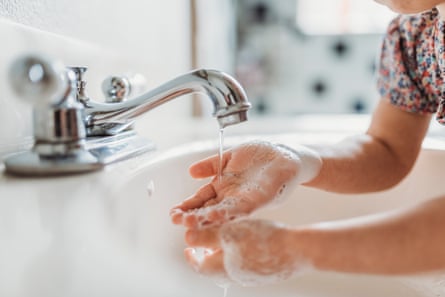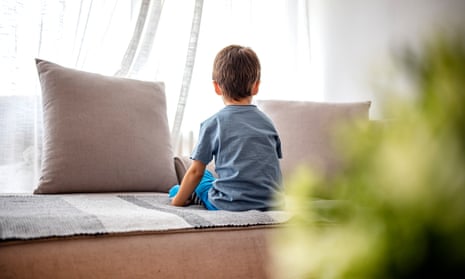Let me introduce you to a little girl called Miriam. She’s five years old and attends a primary school in north-east London. The adults who know her describe her as a confident, outgoing child. “She has a hugely adventurous spirit; she wants to try everything,” said one. But the pandemic that continues to spread fear and uncertainty across all our lives has made her scared of the world around her.
Getting to sleep is difficult for Miriam because she has nightmares. Especially on Sundays. Coming into school is hard, because she doesn’t want to leave her mother. Sometimes she gets angry and clings to her mum. “Am I safe enough to do this on my own?” she’s thinking, and sometimes the answer she gives herself is no. “Her wings have been clipped by Covid,” says the school-based counsellor who works with her. She is not alone.
Concerns about the devastating impact of the pandemic on mental health have been well aired since Covid-19 first swept the globe, forcing schools to close and countries into lockdown, but the focus has been for the most part on older children and teenagers who have seen their lives turned upside down, their exams cancelled, their futures thrown into doubt.
But what of our youngest pupils, who have missed school without knowing what they’re missing and shouldn’t have a care in the world?
On the upside, psychologists and educationalists agree many will have benefited from the extra time and attention they received from parents, whose own lives were paused as the world locked down – even if they have missed significant milestones and rites of passage: the birthday parties, play dates and sleepovers with grandparents, the swimming lessons, dance classes and (the current government obsession) Christmas nativities. Many, however, , have also been cooped up in cramped accommodation, cared for by anxious, overstretched parents who are struggling with their own demons.
How are they all coping now? What will it mean for them in the future? And how are they feeling as the new Omicron variant takes hold across the globe, threatening to derail our journey back to a more normal life?

A Guardian callout prompted dozens of responses from parents of five-year-olds. Some said their children had thrived. “Brilliant and resilient throughout,” said one. “Largely unfazed”, said another. But many more who responded were anxious about their children – such as Bella, a business analyst in the south-west of England. Her son appeared to cope well with lockdown at the start of this year. “He was home and, although he watched far too much TV, he was OK. He did miss some of his friends, but, as he had always suffered with separation anxiety, I think he felt more comfortable being home with me.”
But as the lockdown wore on and Bella could not always give him her full attention because of her work, he struggled, shouting and playing his musical instruments as loudly as possible. Whenever they had to go out, he would obsessively wash his hands and apply alcohol gel until his skin was red and raw. Because he has asthma, infections have gone to his chest and he has had to undergo repeated PCR tests, which have left him traumatised.
“The first one was OK,” said Bella. “But since then every one has been progressively worse. We honestly don’t think we will be able to get him to do another as it makes him so distraught.”
He has also started to worry about spreading any infection he might pick up to others. “This week he told me he had a ‘big tummy ache’ and I knew it was anxiety-based. He has lost family to Covid, and we do have several vulnerable family members, so he does know the impact of spreading it, but it is so sad that a five-year-old should feel so anxious about something he should never have to worry about.”
Freya’s mum is also concerned. Freya is an only child and loves company. “We used to go to all sorts of groups and clubs together, which she thrived on.” But when England went into lockdown in January, “she was so lonely and isolated that she stopped eating”.
“Now she is back at school, she is much, much happier. But there are still significant scars. She is very anxious about germs and infection, and washes her hands obsessively. When one of her friends vomited in front of her recently, she was so anxious about catching the infection that she didn’t sleep all night.
“Although she loves school, she is struggling to engage with the academic side of it. She also doesn’t really look forward to planned events any more because she always suspects that they may be cancelled because of the virus.”
Freya barely remembers a time before Covid. “This Covid world is the world she knows and remembers. It causes her anxiety, stress and disappointment, and I worry that these will be things which she carries with her for life.”
Anna’s son is also struggling. “My little boy was very anxious about leaving the house during the first lockdown. Despite it being warm and sunny, he wanted to just be inside. When Boris announced it was time to go back to school, he came out in a rash that the doctor eventually diagnosed as hives – they had never seen such a stress reaction in a child so young.
“We regularly have tears about going to school and him telling us that he’s scared. He can’t watch any Disney film that has death in it as he’s so scared of his parents and grandparents dying – something he shouldn’t be thinking about so young.”
Other parents who got in touch with the Guardian described a variety of concerning behaviours. One mother said her child was wetting herself at school despite being dry for months before, another has developed facial and vocal tics, while another child is grinding their teeth. There is a lot of obsessive hand-washing and widespread anxiety about germs. Meanwhile, the pandemic has been incorporated into play – children make vaccines with Duplo and when they play shops, anyone not wearing a mask is ordered to leave.

Teachers have reported a lot of separation anxiety, with more clinginess than normal, children not wanting to let go of their parents, less capacity to focus. The five-year-olds “are not like five-year-olds”, said one Norfolk primary school teacher. “At best, they are emotionally and socially three or four. All instructions have to be short, direct and repeated. All tasks have to be simply and fully supported. They are tired, sad and generally overwhelmed.”
Simon Kidwell, the principal of Hartford Manor primary school in Cheshire, says that when children came back to school after lockdown, some of his youngest struggled to communicate with each other and had little idea of how to take turns or play together. “Some children have had a great time during lockdown because they’ve had more adult attention, but we’ve also seen children who have been isolated during lockdown and they found it difficult. Our youngest children were not speaking to each other; they were playing in isolation. They were quiet and withdrawn.”
Things have improved since the start of the autumn term, but, he says: “The youngest out of all the children are the most impacted. Some parents are still very anxious about sending them to school. Our attendance for this week is 92%, which is very low. We would normally be at 97%.”
Place2Be is a children’s mental health charity working with more than 300 primary and all-through schools, offering one-to-one and group counselling. “We are seeing an increase in separation anxieties, mood swings, attention difficulties, worries and sadness,” said one counsellor.
“At the beginning of this year there was a kind of fizzing energy about them. There were squabbles and unkindnesses. They were not ready to learn. It’s much calmer now. But they’ve had very, very early experiences of disruption, inconsistency and uncertainty, and of the world not being a safe place. All of those things will have an impact.”
The effect of the pandemic on younger children has not been researched to the same degree as older children. One key study, however, has been the Co-Space study, a UK-based longitudinal survey of parents and carers that has been running since the fifth day of the UK’s first national lockdown in March 2020. According to Dr Polly Waite from the University of Oxford, who led the study alongside Prof Cathy Cresswell, there was a “really striking” difference in how the pandemic affected the mental health of children aged four to 10, compared with 11- to 16-year-olds.
“The 11- to 16-year-olds with their own phones were able to interact with their peer group,” Waite says. “The younger ones who would normally be running around in the playground with their friends were isolated from their peer group, with parents who were feeling understandably really stressed during that period.”
More than 60% of parents in the Co-Space study reported they did not feel able to meet the needs of both their children and their work. Parental stress was particularly high in single-adult households, among low-income families and where children had special educational needs or neuro-developmental disorders. “Most parents,” Waite says, “were not their best parenting selves during the pandemic.”
How worried should parents of young children be? Prof Vivian Hill, the programme director for educational psychology training at UCL Institute of Education, says that many children who had anxiety and separation difficulties as a result of Covid have already adjusted and settled well at school. She adds: “A few will continue to be vulnerable to stress and anxiety triggers when facing adverse events. This pattern of behaviour can continue for some time, but within a supportive environment and with adults teaching the child the right strategies, over time they will develop coping strategies and learn to manage triggering events. While life events impact on us all, we can recover, given the right support.”
To some extent, Miriam – that adventurous but terrified little soul we met at the beginning – bears this out. Her teachers are working hard to help her and she is being supported by Place2Be. She still struggles to separate from her mum, and Sunday nights are still the worst for getting to sleep. She still complains about tummy aches and headaches and she sometimes wants to stay at home.
But she is learning to cope. She has a keyring with her mum’s picture in it, which hangs on her belt until home time. At school, she can look at it whenever she wants, and she can put it away when she doesn’t need to. It’s helping her to deal with the fear and uncertainty that engulfed her five-year-old life.
Some names have been changed
